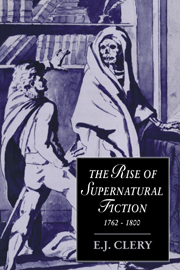Book contents
- Frontmatter
- Contents
- List of illustrations
- Acknowledgements
- Introduction
- PART I TECHNIQUES OF GHOST-SEEING
- PART II THE BUSINESS OF ROMANCE
- 3 The advantages of history
- 4 Back to the future
- 5 The value of the supernatural in a commercial society
- PART III THE STRANGE LUXURY OF ARTIFICIAL TERROR
- PART IV MAGICO-POLITICAL TALES
- Afterword
- Notes
- Bibliography
- Index
- CAMBRIDGE STUDIES IN ROMANTICISM
5 - The value of the supernatural in a commercial society
Published online by Cambridge University Press: 03 December 2009
- Frontmatter
- Contents
- List of illustrations
- Acknowledgements
- Introduction
- PART I TECHNIQUES OF GHOST-SEEING
- PART II THE BUSINESS OF ROMANCE
- 3 The advantages of history
- 4 Back to the future
- 5 The value of the supernatural in a commercial society
- PART III THE STRANGE LUXURY OF ARTIFICIAL TERROR
- PART IV MAGICO-POLITICAL TALES
- Afterword
- Notes
- Bibliography
- Index
- CAMBRIDGE STUDIES IN ROMANTICISM
Summary
THE SUPERNATURAL SUBLIME
It is not altogether surprising, given the complexities of the experiment, that ‘men of brighter talents’ did not at once follow Walpole down the new route he had struck out. In 1772 an anonymous tale of Norman times entitled The Hermitage was published, which included visions, portents, a scene of supernaturally instrumented devastation on a par with Otranto and, possibly for the first time, introduced a wicked double-dealing monk. It sunk almost without trace, in spite of the editor's care to point out its exemplary usefulness: ‘The work, in general, inculcates resignation to the will of Heaven, filial reverence, and universal love.’ Fantastic fiction, it seemed, could not compete with the realist novel on its own didactic territory.
The obvious solution was an independent theoretical justification for use of the supernatural. This is what Anna and John Aikin aimed to provide with their essay ‘On the Pleasure Derived From Objects of Terror’, which appeared in a collection of miscellaneous critical writings in 1773. Here the arguments popularised by Burke's Enquiry into the Origin of our Ideas of the Sublime and Beautiful (1757) were applied specifically to tales of the marvellous and supernatural. The essay begins by considering the pleasure taken in scenes of human affliction: here the cause is easily discovered, for nature systematically connects satisfaction with any emotion which, like sympathy, is ‘productive of the general welfare’. The delight in terror, on the other hand, seems to present a real paradox. The evidence for it is universal yet difficult to explain. Ghost stories and tales of natural disasters are alike greedily ‘devoured by every ear’.
- Type
- Chapter
- Information
- The Rise of Supernatural Fiction, 1762–1800 , pp. 80 - 92Publisher: Cambridge University PressPrint publication year: 1995

